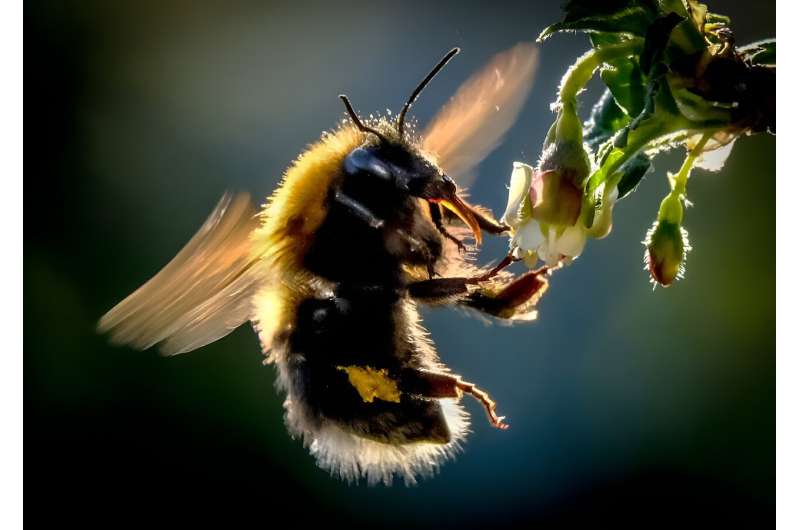Over time at the beaver pond we observed individual beavers learning. Both in trial by error where they would attempt something the wrong way over and over again until they accidentally did it ‘right’ Also in the kind of social learning that comes from watching others skillfully do something successfully and trying it themselves.
But I wonder if we ever saw this…
Not just humans: Bees and chimps can also pass on their skills
One of humanity’s crowning talents is called “cumulative culture”—our ability to build up skills, knowledge and technology over time, improving them as they pass down through the generations.
This ability to transfer abilities no individual could learn by themselves is credited with helping driving humanity’s rise and domination of the world.
Previous experiments have demonstrated that some animals are capable of what is known as social learning—working out how to do something by observing others of their kind.
Some of these behaviors seem to have been perfected over time, such as the incredible navigational talent of homing pigeons or chimpanzees’ ability to crack nuts, suggesting they could be examples of cumulative culture.
But it is difficult for scientists to rule out that an individual pigeon or chimp could not have worked out how to do achieve these feats by themselves.
I remember reading something like this in undergrad. A maze that was filled with water and then mice were taken through it in a makeshift boat and shown where to turn left of right etc.
Then when the maze was emptied they could find the cheese much faster than the other mice who hadn’t taken the educational cruise.
Mostly I remember that study because I thought it was a cute idea, pulling along little mice by a string through a maze. It amused me.
But what about the children of that mouse? Would they be faster at the maze too?
 The first step was training a crack squad of “demonstrators” to do a complex skill that they could later teach to others.
The first step was training a crack squad of “demonstrators” to do a complex skill that they could later teach to others.
In the lab, some bees were given a two-step puzzle box. They were tasked with first pushing a blue tab, then a red tab to release the sugary prize at the end.
Alice Bridges, a study co-author also from Queen Mary University, told AFP: “This task is really difficult for bees because we are essentially asking them to learn to do something in exchange for nothing” during the first step.
To motivate the bees, the researchers put a sugary treat at the end of this first step which was gradually withdrawn as they mastered the process.
The demonstrators were then paired up with some new “naive” bees, which watched the demonstrators solve the puzzle before having a go themselves.
Five of the 15 naive bees swiftly completed the puzzle—without needing a reward after the first stage.
So bees can transmit cumulative culture? You know my next question. If BEES can do it what about BEAVERS? I mean if a beaver learned now to cache food for the winter but his offspring lived in a warmer climate where it wasn’t necessary until he was relocated back to the highlands would his offspring have an easier time learning what to do?
Chimpanzees—our closest living relatives—also seem to possess this talent, according to a separate study in Nature Human Behaviour. The puzzle box for a troupe of semi-wild chimpanzees at the Chimfunshi Wildlife Orphanage in Zambia was a little more difficult.
It involved retrieving a wooden ball, holding open a drawer, slotting in the ball then closing it to release the peanut prize. Over three months, 66 chimps tried and failed to solve the puzzle. Then the Dutch-led team of researchers trained two demonstrator chimpanzees to show the others how it was done.
After two months, 14 “naive” chimps had mastered it.
And the more the chimps watched the demonstrators, the quicker they learned to solve the problem.
Bridges said the studies “can’t help but fundamentally challenge the idea that cumulative culture is this extremely complex, rare ability that only the very ‘smartest’ species—e.g. humans—are capable of”.
Obviously this means that chimps learn better from other chimps and beavers learn better from other beavers. But it also suggests that an entire colony of beavers is likely to benefit from the social learning obtained by one parent.
Is beaver culture passed down through generations? Do the grandchildren of the Martinez Beavers have an inkling about communities of people watching them in the summer? Do beaver that figured out how to block flow devices produce colonies that are similarly skilled?






































